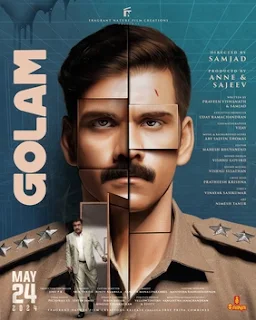Director: Arfaz Ayub
 |
| https://www.imdb.com/title/tt27328373/ |
Thanks, SD, again, for the recommendation.
This time around, it is a mind-bending psychological noir thriller quite atypical of what is often seen in most Indian movies. Minus the psychedelic multiple eye-catching costumes, ornaments and landscape, we land ourselves in a monochromatic desert-like location. It is set in a God-forsaken train crossing quite far from human civilisation. The gate at the crossing is manned by a single individual who stays in his quarters just by its side. There is no human contact for miles and miles away. His only conversation with the outside world is the phone call announcing the passing of the next train. Conversations on the telephone can only be made one way. The only excitement around there was the sound of the speeding train.
One day, he finds a pretty unconscious woman in the form of Amala Paul stranded near the crossing, apparently after falling off a moving train. So starts a human interaction for this gatekeeper in years. He carries the lady to his quarters. She comes around to narrate her sob story. She used to be a psychiatrist who fell in love with her patient. After marriage, she found him to be a cocaine-snorting abusive husband who had killed his first wife. According to her, she jumped off the train to escape her husband's tyranny.
The sympathetic guard promises to protect her. When a call announces the next train, the lady forbids him from asking someone to help her reach civilisation.
The lady then discovers, while cleaning the quarters, some newspaper clippings of a mass murderer and another railway ID card with the guard's name but a different face. The lady puts two and two together and concludes that the guard is the mass murderer and has assumed the name of the real guard that he must have killed. She suddenly starts seeing him from the angle that she could be his next victim.
.jpeg) |
| femme fatale in red hue? |
The guard tries to get rid of the husband but fails. The husband sees his wife's garment.
Next is a three-way showdown to determine who will come out on top. It was 'game theory' on full display. Who is telling the truth, and who are the mad killer(s)?
This tense, high-strung thriller is reminiscent of a western film where life is cheap, or a scene in 'The Deer Hunter’ where American prisoners are forced to play Russian roulette. A good film, sans masala, draws the audience to the edge of their seats.
P.S. The movie was shot in Tunisia, hence the desert-like background in the movie, not Rajasthan.
Best film quote: "God doesn't care about us anymore!"

_official_poster.jpg)














.jpeg)
.jpeg)







